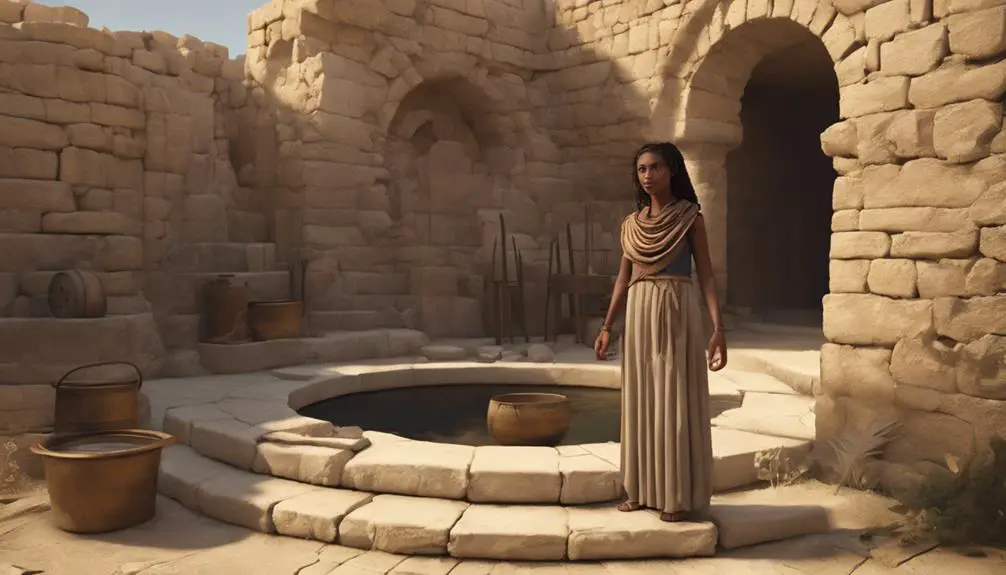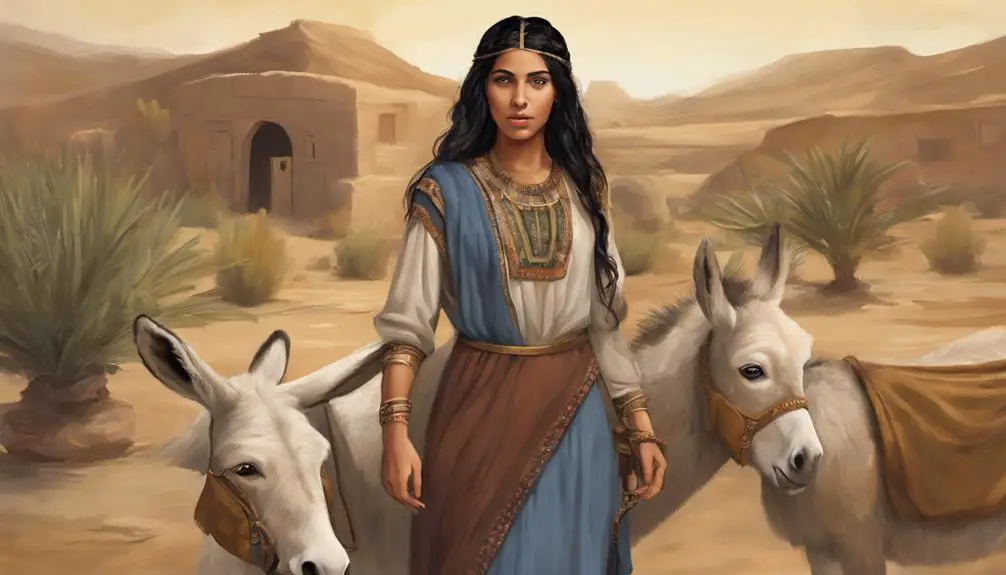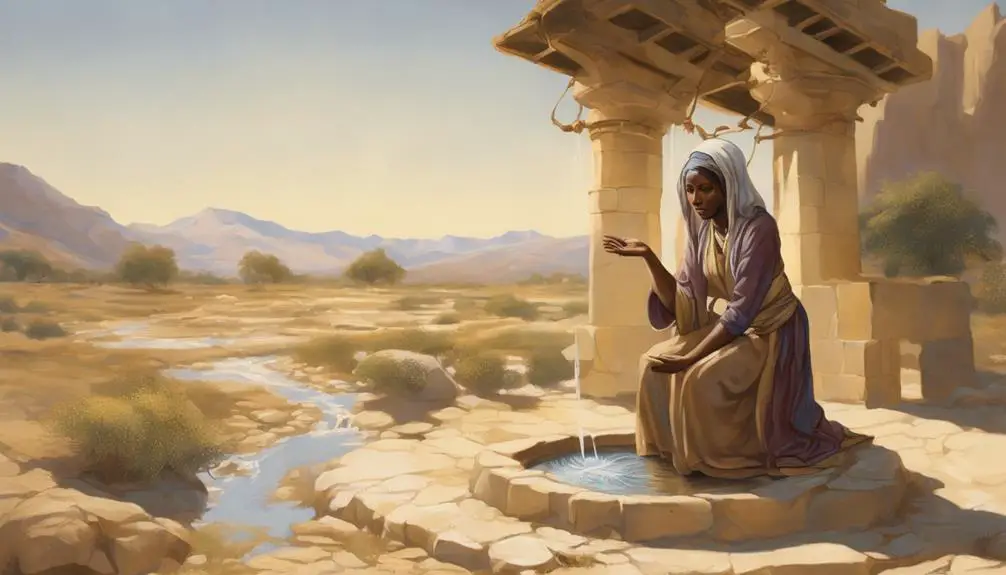Trace the intriguing, often overlooked narrative of Achsah, a minor biblical figure whose tale reveals much about women's status in ancient times.

Achsah in the Bible
Imagine you're peering into an intricate tapestry of an ancient story, and a figure that is often overlooked catches your eye – Achsah. She's a minor figure in the Bible, appearing briefly in Joshua and Judges, yet her story is intriguing and layered with significance.
You've probably heard about her father, Caleb, but what about Achsah? What makes her story unique? Her narrative, though brief, provides a fascinating insight into the status and rights of women in biblical times.
Let's pull at that thread and unravel her tale.
Key Takeaways
- Achsah, Caleb's daughter, is a biblical figure known for her assertiveness and strategic thinking.
- Her request for land symbolized her boldness, wisdom, and active pursuit of enhancing her inheritance.
- Achsah's story teaches lessons on courage, faith, and standing up for one's rights.
- Achsah's narrative continues to inspire Christian women, promoting empowerment, equality, and a strong faith foundation.
Historical Context of Achsah

To truly understand Achsah's story, you need to dive into the historical context that shaped her life and actions in the Bible. Achsah's lineage plays a significant role in understanding her. She's the daughter of Caleb, a man of great faith and one of the two spies who advised the Israelites to conquer Canaan. This ancestry granted her a certain social standing, thus influencing her actions.
Cultural norms of the time also played a pivotal role in Achsah's narrative. Women were often viewed as property, their marriages arranged to strengthen political or familial ties. However, Achsah's story contradicts this norm. Despite her father's offering her as a prize to whoever conquers a city, she's not a passive character. Her request for a piece of land is a significant act of assertiveness, defying the cultural norms of her time.
Understanding Achsah's lineage and the cultural norms helps to shed light on her complex character. It's not just about her actions, but also the societal context that influenced her. So, while you interpret Achsah's story, remember to consider these factors that played a part in shaping her narrative.
Achsah's Biblical Appearance

Now that you've got a grasp on the historical and cultural backdrop, let's look at Achsah's role in the biblical narrative itself.
Achsah's personality shines throughout her biblical appearances. She's portrayed as a strong, assertive figure—traits uncommon for women of her time. Her brief yet powerful presence in the Bible allows for varied biblical interpretations. Though her physical appearance isn't explicitly described, her persona paints a vivid picture.
To further understand her, consider this table:
Biblical Verse |
Achsah's Actions |
Interpretation |
|---|---|---|
Joshua 15:16-19 |
Achsah requests land from her father, Caleb |
Demonstrates Achsah's assertiveness |
Judges 1:12-15 |
Achsah convinces her husband to ask for additional land |
Shows her strategic thinking |
1 Chronicles 2:49 |
Achsah is listed in the genealogy of Judah |
Reinforces her importance in biblical history |
The table highlights key moments in Achsah's biblical appearances, giving us a glimpse of her personality and how it informs biblical interpretations. It shows that Achsah wasn't just a passive character; she actively shaped her destiny. Her assertiveness and strategic thinking set her apart, making her a fascinating figure to study within the biblical context.
The Significance of Achsah's Request

Delving into Achsah's request for land, you'll find it holds significant implications for understanding her character and the broader biblical narrative. This request wasn't a mere plea for more assets; it was chock-full of symbolism.
The request symbolism is revealed in her boldness and wisdom. Achsah didn't passively accept her inheritance but actively sought to enhance it, showing remarkable courage, assertiveness, and foresight. Her request also symbolized her understanding of the importance of land in biblical times as a source of livelihood and security.
Analyzing Achsah's inheritance, you'll notice it wasn't just about material wealth. Her inheritance represented her rightful place within her family and society. By boldly asking for more, she was challenging societal norms, asserting her rights, and setting an example for other women in a male-dominated society.
Achsah's request also reflected her faith in God's provision and promises. She didn't limit her expectations to what was visible or readily available, but rather sought out the “springs of water”, a metaphor for abundant blessings.
Lessons From Achsah's Story

Drawing lessons from Achsah's story, you'll find her actions and decisions provide valuable insights into courage, faith, and the pursuit of one's rights, even in challenging societal norms. Achsah's Courage and Achsah's Faithfulness are both evident in her story.
To further demonstrate, consider the table below:
Lesson |
Achsah's Action |
Insight |
|---|---|---|
Courage |
Achsah asked her father for land |
She wasn't afraid to voice her needs |
Faith |
Achsah trusted God for her future |
She knew God would provide |
Rights |
Achsah pursued her inheritance |
She stood up for her rights |
Societal Norms |
Achsah acted despite being a woman |
She defied societal expectations |
Persistence |
Achsah persisted with her request |
She knew the value of perseverance |
From Achsah, you learn that courage isn't about being fearless; it's about acting in spite of fear. Her faithfulness is shown in her trust in God's provisions. Achsah's pursuit of her rights demonstrates the importance of standing up for oneself. Despite societal norms that might have discouraged her, Achsah acted, teaching us to defy unjust expectations. Finally, persistence is key, as shown by Achsah's insistence on her request.
Achsah's Impact on Christian Women

Building on the lessons from Achsah's story, let's explore how her actions and decisions have influenced and continue to inspire Christian women today. Achsah's influence is notable through her boldness and foresight; characteristics that are highly valued in the Christian faith.
She showcased empowerment through faith by asking for more than what was given to her, demonstrating that Christian women can, and should, courageously ask for what they need. This symbolises the power of prayer and petition. Achsah didn't just passively accept her situation, she sought to improve it, providing a powerful example of proactivity for Christian women.
Her story also encourages women to take an active role in their spiritual and physical lives. She didn't wait for someone else to solve her problems, she took initiative. This is a clear indicator of how faith can empower women to take control of their circumstances.
Furthermore, Achsah's example reinforces the principle that women have an equal standing in the eyes of God. Her story serves as an encouragement for Christian women to step up, speak out, and trust in the Lord for their needs. Thus, Achsah's narrative continues to inspire and shape the lives of Christian women, promoting empowerment through faith.
Frequently Asked Questions
What Is Achsah's Lineage in the Bible?
You're asking about the lineage of a particular character, not explicitly mentioning it's from the Bible.
In the biblical context, Achsah is the daughter of Caleb, an influential figure. She's a notable example of Biblical feminism, demonstrating considerable influence in her interactions.
Through her, we see an early example of women asserting themselves in a patriarchal society.
Her lineage, therefore, is significant in understanding her role and influence in the biblical narrative.
How Does Achsah's Story Relate to the Broader Themes of the Bible?
Your understanding of broader themes in the Bible can be deepened through Achsah's story. Achsah's influence showcases the theme of Biblical feminism. She actively requests land from her father, demonstrating the power of women's voices.
This narrative suggests that even in a patriarchal society, women can assert their rights. It's a powerful affirmation of female agency and affirms the Bible's overarching theme of courage and faith.
What Is the Meaning of Achsah's Name in Hebrew?
In Hebrew, Achsah's name means 'anklet' or 'adorned.' It's a unique name that might imply her influence and legacy.
It's not just a name, but a symbol of her role and identity. You could consider it a reflection of her strength and determination.
Are There Any Historical or Archaeological Evidence That Supports Achsah's Story?
While there's no direct archaeological evidence supporting Achsah's story, it's crucial to consider her influence. Her narrative, a cornerstone of biblical feminism, highlights women's roles in ancient society.
However, it's often the case that historical and archaeological records don't capture these personal stories. Therefore, while we can't validate Achsah's tale with physical proof, it remains an essential part of cultural and religious discourse.
How Is Achsah's Story Interpreted in Different Christian Denominations?
Different Christian denominations interpret Achsah's story in varying ways. Some view her as a symbol of biblical feminism, asserting her wishes to her father Caleb. Others consider her a model of faith, focusing on Achsah's influence and leadership.
It's important to note, your understanding of her story may be shaped by your own beliefs and the teachings of your specific denomination. Always ponder and critically analyze these interpretations for a deeper understanding.
Conclusion
Achsah's story in the Bible, though brief, is rich with insight. Her bold request showcases the power of asking for what you want, a lesson still relevant today.
As a Christian woman, you can draw strength from Achsah's example. She was a woman of faith who wasn't afraid to assert herself. Remember her story as a testament to the role of women in biblical history and their potential for influence and impact.



Sign up